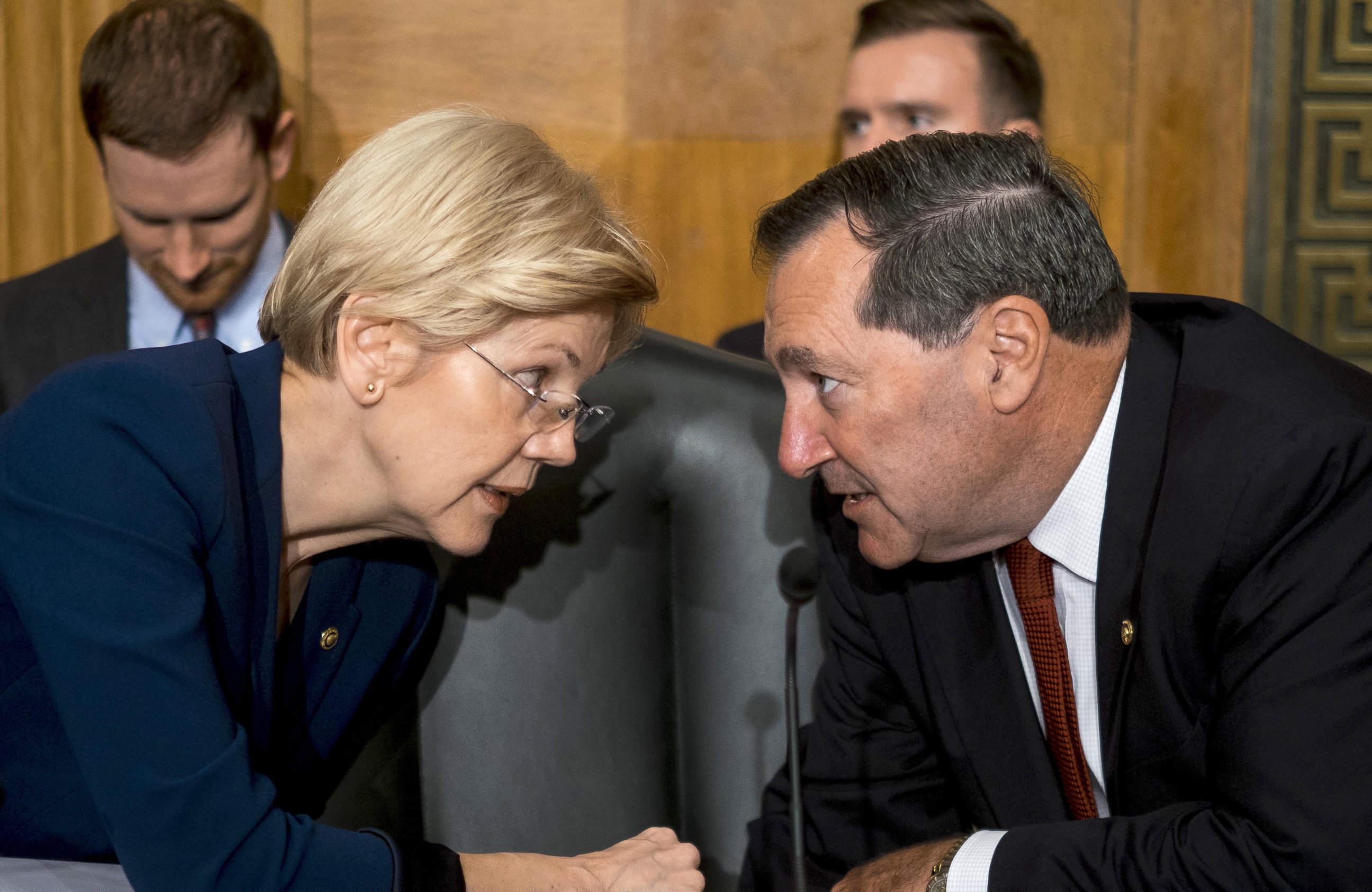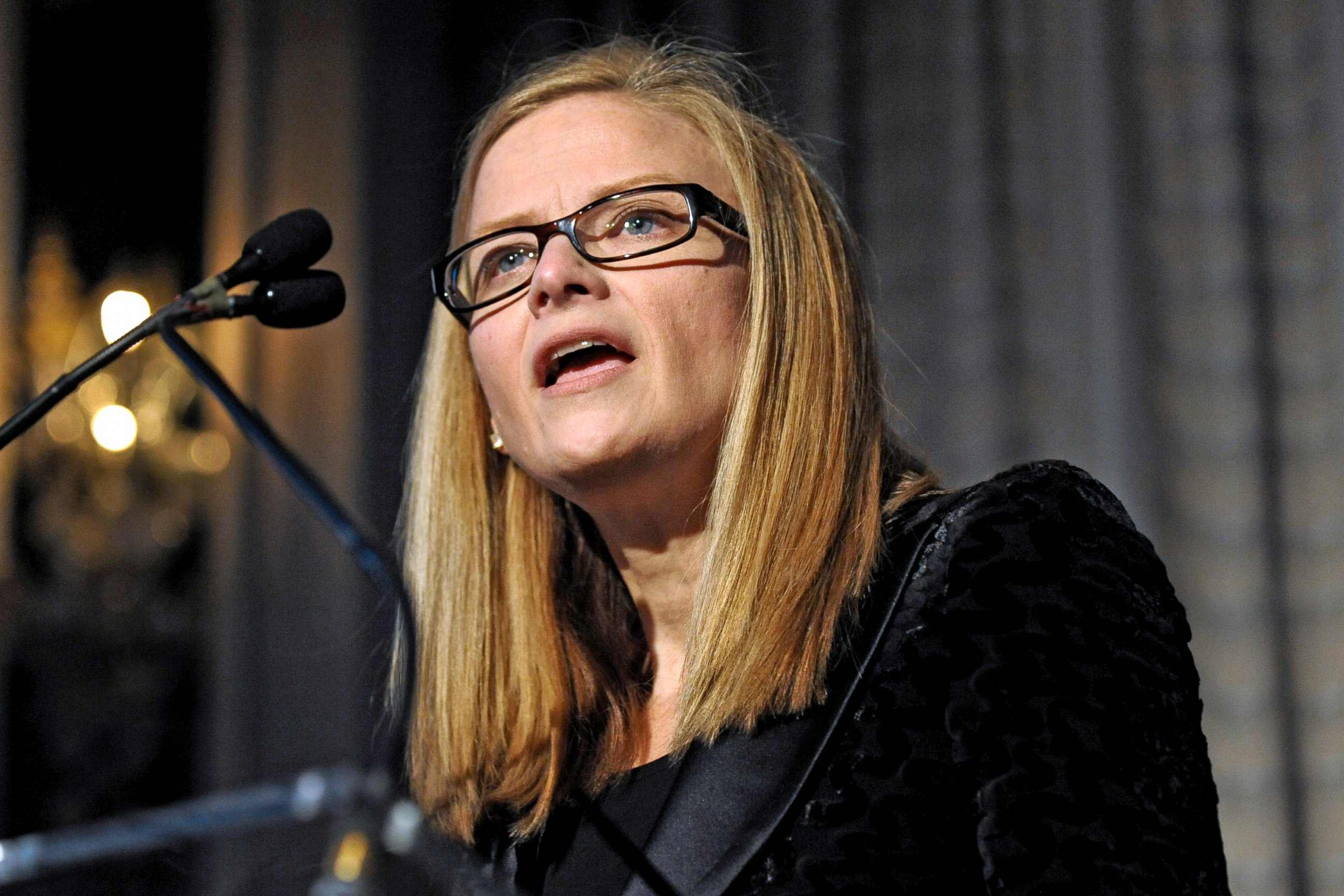Wells Fargo CEO John Stumpf Told to Resign by Sen. Warren
Stumpf was the key witness in a fiery Senate hearing.
New York -- Amid tense questioning on Capitol Hill this morning, Sen. Elizabeth Warren, D-Mass., told Wells Fargo CEO John Stumpf that he should resign and face criminal charges amid a scandal over allegations that bank employees opened accounts without customers’ authorization.
Warren was far from the only senator to criticize the bank chief, with Republicans and Democrats both grilling him for over two hours.
Sen. Jon Tester, D-Mont., said Stumpf achieved something that he hadn’t seen in his 10 years on the committee: unity.
“You have done something that’s never happened and united this committee on a major topic … and not in a good way,” Tester told Stumpf.
The hearing is the most public appearance by the embattled CEO since the scandal erupted earlier this month. A second panel examined regulators’ actions regarding the scandal.
Stumpf’s opening remarks varied from those leaked to the press on Monday night and in one respect went further by including language that the Wells Fargo board could “hold senior leadership accountable” for any actions it deemed inappropriate.
He also announced that the company would extend its review of customer accounts to include 2009 and 2010. It previously reviewed accounts dating back only to 2011.
On Sept. 8, regulators in Washington and California fined the bank $185 million after they said an internal review found that employees opened or applied for more than 2 million bank accounts or credit cards without customers’ knowledge or permission from May 2011 to July 2015. The bank confirmed that it fired some 5,300 employees in connection to the allegations.
While Democratic Senate Banking Committee members were widely expected to grill Stumpf over the allegations, they were joined by their Republican colleagues in repeatedly calling the activity fraud.

Warren Tells CEO to Resign
Unsurprisingly, the fiercest language came from Warren, a consumer advocate who has been critical of the nation’s big banks.
Warren, who at times became impassioned, told Stumpf that he should leave his post and face a criminal investigation.
“You should resign,” she said. “You should give back the money that you gained while this scam was going on, and you should be criminally investigated by the [Department of Justice] and the [Securities and Exchange Commission].”
An SEC spokesman, John Nester, told ABC News that the commission “can neither confirm or deny the existence or nonexistence of investigations” that it is conducting. A Wells Fargo representative declined to comment.
Executive Pay
Sen. Bob Corker, R-Tenn., told Stumpf that he would be engaging in “malpractice” if the bank doesn’t “claw back” money that it paid to executives during the period that the accounts were being opened without customers’ permission.
The salaries and bonuses of Stumpf and other executives, especially Carrie Tolstedt, formerly the head of the bank’s community banking division, whose retirement was announced in July, have become the subject of scrutiny in recent weeks.
Senators have repeatedly cited a figure from a report by Fortune magazine on Sept. 12, which claims that Tolstedt will leave the bank “with $124.6 million in stock, options and restricted Wells Fargo shares.”
The bank did not immediately return a request for comment on the figure.

The ability to claw back the compensation does appear to be a viable option, with Stumpf telling the panel that “the Wells Fargo Board ... has the tools to hold senior leadership accountable, including me and Carrie Tolstedt, the former head of our retail banking business.”
Additionally, in a filing with the SEC earlier this year reviewed by ABC News, the bank said that it had “strong recoupment and clawback policies in place, designed ... [to] discourage our executives from taking imprudent or excessive risks.”
“I want to be clear on this: I will respect and accept the decision of the board,” Stumpf told senators today.
Many senators, however, were incensed when he later deferred to the board whether any actions would be taken. Stumpf is the board’s chairman.
Who’s to Blame?
Corker was just one of several Republicans who were critical of Stumpf and Wells Fargo.
Sen. Jerry Moran, R-Kan., told the CEO that he should stop scapegoating low-level employees for the alleged misconduct.
“I’m not scapegoating, but that is not part of our culture,” Stumpf responded.
Last week, in an interview with The Wall Street Journal, Stumpf reportedly blamed the opening of the accounts on employees.
During the Senate hearing today, he said that he had been misunderstood during that interview.
Throughout the hearing, he seemed to try to shift blame to the bank’s product sales goals program, which will be eliminated as of Jan. 1, 2017.
He said, “We should have done more sooner to eliminate unethical conduct or incentives that may have unintentionally encouraged that conduct.”
In his opening remarks, Stumpf took time to thank the “268,000 team members” who work for the bank.
During the hearing, Stumpf wore a brace and a bandage. Wells Fargo spokeswoman Jennifer Dunn declined to give further details about the injury. Earlier she reportedly told The Charlotte Observer that he was hurt playing with his grandchildren.
Examination of the Regulators
During the second half of the hearing, lawmakers questioned leaders of three oversight agencies involved in the Wells Fargo scandal. Stumpf was not present.
Richard Cordray, the director of the Consumer Financial Protection Bureau, said the fine imposed on Wells Fargo – $100 million, the largest in the five-year-old agency’s history – was justified.
“Some have said it should be higher,” Cordray said. “But it is justified here by the outrageous and abusive nature of these fraudulent practices on such an enormous scale.”
Scandal Origins
The Senate hearing is the latest development in the scandal that has engulfed the bank in recent weeks.
The allegations came to light when the Consumer Financial Protection Bureau fined the bank. The Office of the Comptroller of the Currency slapped the bank with a $35 million fine, and the county and city of Los Angeles fined it an additional $50 million.
At the time, the bank said that it regretted and took responsibility for “any instances where customers may have received a product that they did not request.”
The bank has fired some 5,300 employees in connection to the allegations; however, it sought to downplay the terminations, with an official telling ABC News that “the number terminated represents about 1 percent of this workforce over the five year period.”
Investigations have been opened by the FBI and federal prosecutors in New York and California, as well as the House of Representatives Financial Services Committee, which will hold a hearing of its own. A date for that hearing isn’t yet known.
ABC News’ Mary Bruce, Ali Rogin and Margaret Chadbourn contributed from Washington.




